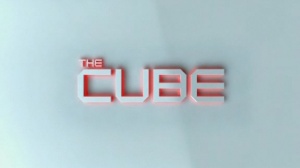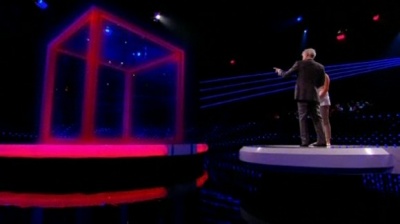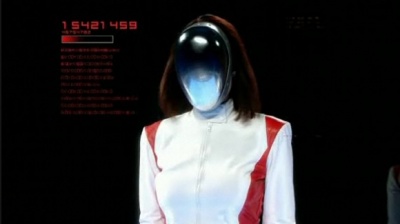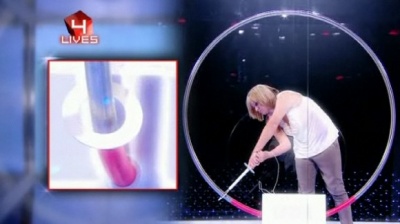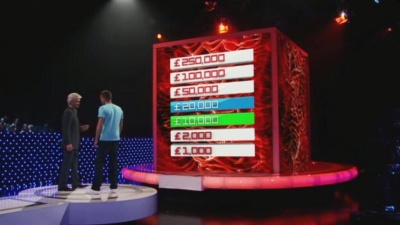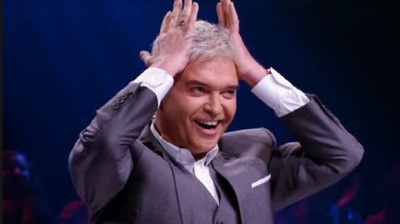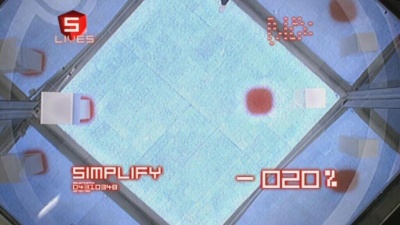The Cube
Contents |
Host
Justin Lee Collins (non-broadcast pilot)
Co-hosts
'The Body' as 'The Body'
The Voice of The Cube: Colin McFarlane
Broadcast
Objective Productions for ITV1, 22 August 2009 to 8 August 2015 (79 episodes in 9 series)
Triple Brew Media (formerly Wildcard Television) and Objective Media Group for ITV, 17 October 2020 to 23 December 2021 (17 episodes in 2 series)
Synopsis
Phillip Schofield hosts as contestants enter a 4 metre perspex cube within which they must complete a series of challenges, for the chance to win up to £250,000.
Taking place in a what looks like a miniature arena, with the audience on three sides, looking down slightly on proceedings, the Cube of the title sits in the middle of the studio floor, connected by a swivelling walkway to a small stage. Before each contestant enters the Cube, they have a quick chat with the host, and we are introduced to four members of their friends and family who are watching from the sidelines.
Once the pleasantries have been completed, we move onto the first challenge, referred to as a game. What this game is varies from episode to episode, and from series to series. Before the contestant enters the Cube, by means of a pre-recorded clip, we are shown the first game being undertaken by a disguised female, known only as The Body, as an ominous voice, known as The Voice of the Cube, explains the rules. Once this is done, and after a quick chat with the host about how they are feeling about the game, the walkway between the small stage and the Cube swivels into place, the doors to the Cube open, and the contestant steps inside to face the first game.
Each contestant starts the show with nine lives. Should they make a successful attempt at the first game, they win £1,000, and return to the small stage to chat again with the host. However for each unsuccessful attempt at a game they lose one life. Should they lose all their lives, they leave with nothing. During all of the games, we are treated to special camera effects, like those most notably seen in the film The Matrix, where the action freezes, and the camera pans around the exterior of the Cube, before the action starts again.
Subsequent games play out in a broadly similar fashion, but with the amount of money on offer increasing quite steeply with Game 2 offering £2,000, Game 3 £10,000, Game 4 £20,000, Game 5 £50,000, Game 6 £100,000, and the seventh and final game offering £250,000. As you would expect however, as the money increases, so does the difficulty of the games.
After successfully completing each game, the contestant can choose to either leave with the money they currently have, or play on. Before deciding whether or not to play each game, like in the first game, the contestant is afforded a look at the game via a video clip featuring The Body. If the contestant decides to play on however, they cannot then back out of a game. In other words they must successfully complete the game, or else leave with nothing.
The Cube offers contestant two means of help. These are the Simplify and the Trial Run. With the Simplify, one element of the game is made easier. This could be a target area being made larger, or a time limit being increased for example. This can be used at any point, but can only be used once. The second means of help, the Trial Run, allows the contestant to have a go at any game, but without penalty or reward. In other words, should they make an unsuccessful attempt at a game during a Trial Run, they do not lose a life. Conversely, should they successfully complete the game during the Trial Run, they must do it again in live play to win the money on offer for that game. Like the Simplify, the Trial Run can only be used once, but in addition can only be used from the second game onwards. Using the Trial Run does not commit a player to playing any game in live play.
Once a contestant has either decided to take what they have and leave, or has lost all of their lives, and has therefore been beaten by the Cube, a new contestant is brought out, and a new set of games begins.
After six years of challenges, The Cube faded into the background in 2015. A call for contestants was made in summer 2020, seeking pairs of contestants for a proposed revival. The money ladder for this version was £2,000, £5,000, £10,000, £25,000, £100,000, £250,000 and then £1,000,000.
Key moments
A contestant taking his trousers off in order to make one of the games easier. Schofield freely admitted that he couldn't believe that he was allowing the contestant to do this - clearly, this was one of the most bizarre moments of his TV career. [And to put that in perspective, this is a man who spent eight years in a presenting double-act with a puppet gopher whose entire vocabulary was "squeak!". - Ed.]
And before the watershed too
Catchphrases
"Game Y is for £X,000, and this is what's inside The Cube."
"For £X,000, enter The Cube."
"The next time I see you, you'll either be out here with £X,000... or nothing."
"Cube, play the game."
The Cube: "Z lives remaining."
"Cube, please simplify the game."
"You didn't beat The Cube, but you took £X,000 out of it."
The Cube: "Contestant... defeated."
"Could you beat The Cube?"
Inventor
Adam Adler
Trivia
The programme was originally pitched at Channel 4, who produced a non-broadcast pilot hosted by Justin Lee Collins.
Series one contestant JJ Bird, who won £10,000, would later appear as a housemate on the eleventh series of Big Brother. Conversely, Toby Olubi, who appeared on the last civilian episode of the original run, would win £12,000 on Deal or No Deal and become a Gladiator.
Voted the Best New Show in this site's Poll of 2009.
In the good old days, when the top prize was just £250,000, only one contestant won the top prize, on 14 July 2012, and it was Olympic Gold Medallist Mo Farah. He had 6 lives remaining.
While the original series was Studio A & B at Fountain Television in Wembley, the 2020 revival was shot in TC1 at Television Centre. It also lacked an audience as a consequence of the COVID-19 pandemic.
Web links
See also
Weaver's Week reviews: 2009 and 2020.

